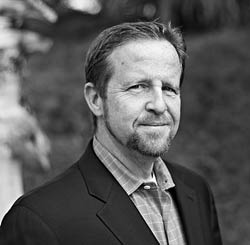Excerpt from:
by Michael Horton.
"Finney believed that human beings were capable of choosing whether they would be corrupt by nature or redeemed, referring to original sin as an
"anti-scriptural and nonsensical dogma" (p.179). In clear terms, Finney denied the notion that human beings possess a sinful nature (ibid.).
"Therefore, if Adam leads us into sin, not by our inheriting his guilt and corruption, but by following his poor example, this leads logically to the view of Christ, the Second Adam, as saving by example. This is precisely where Finney takes it, in his explanation of the atonement.
"The first thing we must note about the atonement, Finney says, is that Christ could not have died for anyone else’s sins than his own. His obedience to the law and his perfect righteousness were sufficient to save him, but could not legally be accepted on behalf of others.
"That Finney’s
whole theology is driven by a passion for moral improvement is seen on this very point: "If he [Christ] had obeyed the Law as our substitute, then why should our own return to personal obedience be insisted upon as a sine qua non* of our salvation" (p.206)?
"In other words, why would God insist that we save ourselves by our own obedience if Christ’s work was sufficient?
"The reader should recall the words of St. Paul in this regard,
"I do not nullify the Grace of God’,
for if Justification comes through the Law, then Christ died for nothing."
"It would seem that Finney’s reply is one of agreement.
The difference is, he has no difficulty believing both of those Premises.
Alan's Note: By Finny "believing both" means he believed lies anytime he wanted to.
"That is not entirely fair, of course, because Finney did believe that Christ died for something—not for someone, but for something.
Alan's Note: "not entirely fair" better mean more like,
let's entirely explore the whole lie.
"In other words, He died for a Purpose, but not for people. The Purpose of that death was to reassert God’s Moral Government and to lead us to Eternal Life by example, as Adam’s example excited us to sin.
Alan's Note: The defines THE ENTIRE LOST WORLD of RELIGION WITHOUT GOD.
Why did Christ die? God knew that
"The atonement would present to creatures the highest possible motives to virtue.
"Example is the highest moral influence that can be exerted ... If the benevolence manifested in the atonement does not subdue the selfishness of sinners, their case is hopeless" (p.209).
"Therefore, we are not helpless sinners who need to,’ be redeemed, but wayward sinners who need a demonstration of selflessness so moving that we will be excited to leave off selfishness.
"Not only did Finney believe that the
"moral influence" theory of the atonement was the chief way of understanding the cross; he explicitly denied the substitutionary atonement, which
ON AND ON AND ON. FINNY TWISSSSTED EVERYTHING, LIKE WESCOTT AND HORT.
* This fake, phony, and False, SATANIC QUESTION, is purely heretical and deceptive,
WHILE THROWING INTO IT A LITTLE DEAD LANGUAGE LATIN CURVE BALL.
That is how a person may fall prey to being touched by a smooth criminal, an enemy of God, God's people, and the lost. Charles Finny was a Professional Quack.
His diabolically sinister, arrogant false teaching:
"If he [Christ] had obeyed the Law as our substitute,
then
why should our own return to personal obedience be insisted upon
as a sine qua non* of our salvation"
Our own return to personal obedience being insisted upon
as a sine qua non* is ABSOLUTELY NOT AN essential condition;
AND ABSOLUTELY NOT a thing absolutely necessary of our salvation.
Anyone Can PLAY INTO THE HANDS OF SATAN AND PRETEND THAT,
"OH, THERE MUST BE SOMETHING TO THAT THAT MAKES IT TRUE",
When facts are "personal obdience" will and certainly should be manifest in the life of a soul that is genuinely Saved, those who may not live right for the Lord, who may for example, in the extreme, commit the sin unto death, DOES NOT MEAN THAT THEY WEREN'T SAVED, and conversely, ALL THE "PERSONAL OBEDIENT LAW KEEPING" FINNY WAS CALLING FOR, DIDN'T CAUSE ANYONE TO GAIN THEIR OWN SALVATION.
noun: sine qua non; plural noun: sine qua nons
- an essential condition; a thing that is absolutely necessary.
...
THE ANSWER: BAPTIST PEOPLE, OTHER RELIGIOUS PEOPLE, AND ALL PEOPLE
SUFFER FROM THE DAMNABLE AFFLICTION WHERE THEY TRUELY BELIEVE:
"JUST BECAUSE SATAN LIED TO JESUS CHRIST
DOESN'T MEAN SATAN CAN TRY TO LIE TO ME."
What do think about that, for some preaching?


